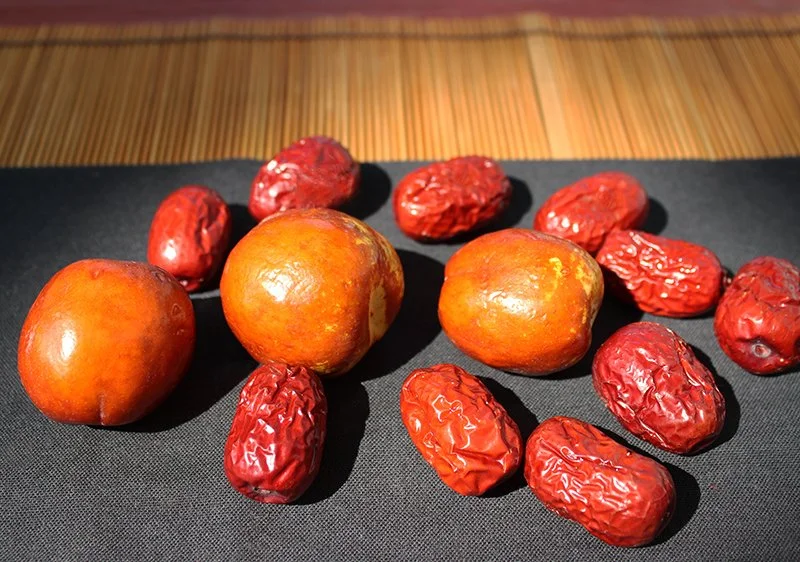TONIC IN FOCUS: Jujube
JUJUBE
Ziziphus jujuba
Used for thousands of years as both food and medicine, jujube fruit (also known as red date or Chinese date) has quietly carried its weight across cultures and continents. Always on the lookout for plants to support our health, we came across an Australian grower of jujubes in Mildura and loaded up with a 10kgs of the dried fruit for our own use at home and to share with the community here on the South Coast.
Dried jujubes have a particularly chewy texture with a sweet, caramel-like flavour. We’ve been snacking on them whole and also adding them to savoury broths as well as making a jujube, goji berry, cinnamon, and ginger tea to serve as our Tonic of the Day at the SAGE Farmers market.
Jujube is native to China and has been cultivated for over 4,000 years, earning its status as one of the most ancient domesticated fruit trees. It spread westward along the Silk Road into Persia, parts of the Middle East, and eventually Europe. In Traditional Chinese Medicine (TCM), it's known as da zao (大枣) and has long been regarded as a harmonising herb, often included in herbal formulas to moderate harsh ingredients and tonify the Qi.
The tree made its way to Australia in more recent times and is gaining popularity in arid and semi-arid regions for its drought-tolerance, minimal pest problems, and resilience in poor soils—making it a promising fruit for regenerative farming and climate adaptation.
Jujube trees are deciduous, hardy, and well-suited to hot summers and cold winters. They’re tolerant of drought once established and prefer full sun and well-drained soil. Grafted trees will fruit in as little as 2–3 years, producing small, plum-sized fruit that ripen to a deep red-brown in autumn.
The fruit can be eaten fresh when crisp like an apple, but it’s most commonly enjoyed dried, when its texture becomes chewy and date-like and its medicinal potency concentrated.
MEDICINAL AND NUTRITIONAL BENEFITS
In both Eastern and Western herbal traditions, jujube is regarded as a calming, strengthening, and nourishing tonic. Its medicinal benefits include:
Nervous system support – Contains compounds like saponins and flavonoids that promote restful sleep and reduce anxiety.
Digestive aid – Soothes the gut, aids assimilation of nutrients, and reduces bloating.
Blood nourishment – Traditionally used to strengthen the blood and improve circulation.
Immune support – Rich in vitamin C, antioxidants, and anti-inflammatory compounds.
Adaptogenic properties – Assists the body in responding to stress and rebuilding resilience.
Jujube is often paired with herbs like astragalus, licorice, or reishi in tonics that restore balance and vitality. In Western herbalism, it’s gaining recognition as a nervine, particularly useful for those recovering from burnout or chronic fatigue.
JUJUBE ACROSS CULTURES
China – Used in both food and medicine, from TCM formulas to nourishing porridges, soups, and beauty tonics. Often combined with goji berries and longan fruit.
Middle East & North Africa – Jujube is called sidr or unnab and is valued for its anti-inflammatory and healing properties, particularly for respiratory and digestive conditions.
Korea – Used in teas and medicinal wines, jujube is part of traditional postpartum care and seasonal health rituals.
India – Known as ber in Ayurvedic tradition, where the fresh fruit is cooling and the dried fruit is used in tonics.
We’ve been introducing customers to jujube in a simple yet potent tea—just dried whole jujubes simmered gently in hot water for 30 minutes with goji berries, cinnamon and ginger. The result is a comforting, earthy-sweet tonic that supports calm energy, digestion, and emotional resilience.
We get such a kick out of introducing people to plants which have support cultures around the world for centuries. Jujube is a fruit which falls into that category and we’ll be hearing more about it in the years to come as the jujube industry in Australia continues to grow.
Andy @ the Nourished Sovereign



